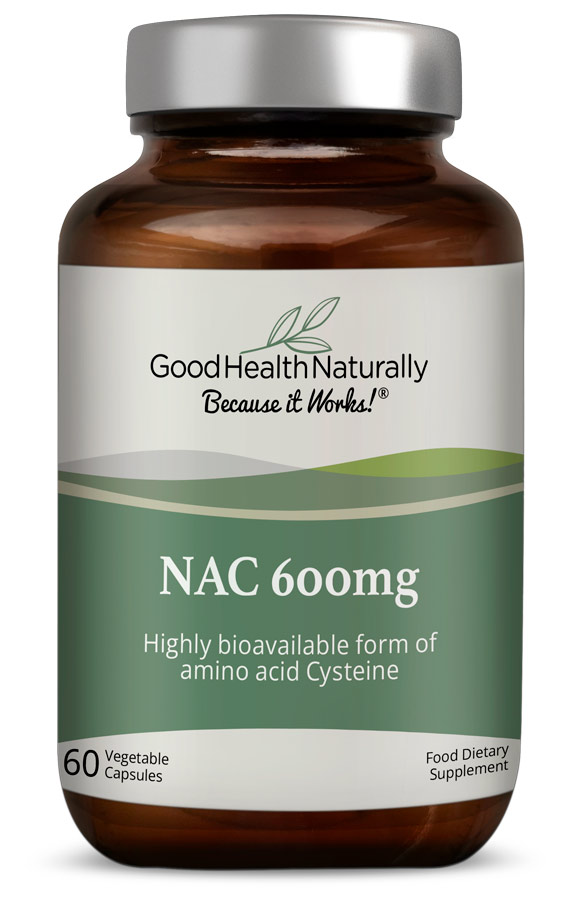There are so many nutritional supplements on the market, and N-acetyl cysteine deserves a moment in the spotlight. It is a derivative of the amino acid cysteine and is well-known for its antioxidant properties. It has long been used by medics to support respiratory health and to treat paracetamol overdose, but now there is emerging evidence suggesting its benefits may extend a lot further to include heart and liver health and even mental well-being. We’ll delve deeper into the benefits of NAC and the science behind its many benefits.
What is N-acetyl cysteine (NAC)?
Before delving into the potential benefits, it’s crucial to understand the basics of NAC. It is a precursor to glutathione, one of the body’s most potent antioxidants. Oxidative stress occurs when the production of reactive oxygen species overwhelms the body’s ability to neutralise them and can lead to cellular damage. It is implicated in numerous health issues, including ageing. Antioxidants help target free radical damage and reduce oxidative stress.
NAC also exhibits anti-inflammatory properties and is thought to inhibit the expression of pro-inflammatory cytokines involved in the inflammatory cascade.
Respiratory Support
N-acetyl cysteine can relieve symptoms of respiratory conditions such as chronic bronchitis, asthma and cystic fibrosis by acting as an expectorant, loosening and thinning mucus in the air passageways, making it easier to expel. NAC may also improve nasal and sinus congestion due to allergies or infections.
As an antioxidant, it helps replenish glutathione levels in the lungs and may reduce inflammation in the bronchial tubes and lung tissue. Long-term oxidative damage and inflammation of lung tissue are associated with chronic obstructive pulmonary disease (COPD). It causes airways to constrict, leading to shortness of breath and coughing. Some studies suggest that taking NAC supplements can help improve symptoms.
People with chronic bronchitis may also benefit from NAC. Bronchitis occurs when the mucous membranes in the lungs’ bronchial passageways become inflamed. By thinning mucus in your bronchial tubes and boosting glutathione levels, NAC may help decrease the severity and frequency of wheezing, coughing, and respiratory attacks.
Mental Health
In recent years, there has been growing interest in the potential benefits of N-acetyl cysteine on brain health. Research into the use of NAC for mood disorders, particularly depression and bipolar disorder, has shown promising results. There are several potential reasons why. Firstly, NAC can effectively cross the blood–brain barrier, where it can raise glutathione levels protecting brain cells from oxidative damage. It also seems to be able to modulate the neurotransmitter glutamate. These conditions are often characterised by imbalances in neurotransmitters, inflammation and oxidative stress.
Glutamate dysregulation is implicated in obsessive-compulsive disorder (OCD). By influencing the glutamatergic system, NAC may help normalise neural pathways associated with obsessive thoughts and compulsive behaviours.
Another area where NAC has shown promise is addiction. This complex disorder involves changes in the brain’s reward circuitry, neurotransmitter systems, and stress response. NAC has been studied for its ability to modulate glutamate levels and reduce oxidative stress, and it may help reduce cravings and promote abstinence.
Detoxification and Liver Health
The liver is one of the main organs for detoxifying the body and relies on glutathione for effective toxin elimination. As a natural detoxifier, NAC can also help remove harmful substances, such as environmental toxins and pollutants, reducing the burden on the liver and contributing to overall systemic health.
Liver diseases seem to be on the increase. Non-alcoholic fatty liver disease (NAFLD) is a prevalent liver condition. It is characterised by an accumulation of fat in the liver cells and isn’t caused by alcohol consumption. It can develop into more severe non-alcoholic steatohepatitis, which involves inflammation and liver cell damage. Oxidative stress is a key contributor to inflammation and liver damage in NAFLD. It is suggested the antioxidant properties of N-acetyl cysteine may help mitigate this. NAC may also improve insulin sensitivity and lipid metabolism, which are also associated with the progression of NAFLD.
N-acetyl cysteine and Heart Benefits
The cardiovascular system is particularly susceptible to oxidative stress, as the heart and blood vessels are constantly exposed to reactive oxygen species. Oxidative damage to the cells lining the blood vessels is a key factor in the development of atherosclerosis, the build-up of plaque in the arteries. It is a significant contributor to heart disease, including heart attacks and strokes. Studies suggest NAC may protect against the formation of these atherosclerotic plaques by reducing inflammation and preventing the oxidation of ‘bad’ cholesterol, which has been linked to the progression of atherosclerosis.
High blood pressure is another significant risk factor for heart disease. The endothelium, which lines blood vessels, plays a crucial role in regulating blood pressure by releasing nitric oxide, a molecule that helps blood vessels dilate. When oxidative stress impairs endothelial function, it can contribute to hypertension. NAC’s ability to enhance nitric oxide production and improve endothelial function has been explored in several studies. By promoting vasodilation and reducing blood vessel stiffness, NAC may contribute to blood pressure regulation.
To Conclude
N-acetyl cysteine stands out as a supplement with substantial potential benefits. It is a powerful antioxidant that supports respiratory health, mental well-being and cardiovascular health. As our understanding of this powerful compound deepens, N-Acetyl Cysteine is poised to become a valuable ally in the pursuit of optimum health.
References
https://www.ncbi.nlm.nih.gov/pmc/articles/PMC8234027/
https://www.ncbi.nlm.nih.gov/pmc/articles/PMC6770193/
https://www.nature.com/articles/s41598-022-05632-x
https://pubmed.ncbi.nlm.nih.gov/21424515/
https://www.ncbi.nlm.nih.gov/pmc/articles/PMC7892733/
https://www.nature.com/articles/s41598-022-05632-x
https://www.ncbi.nlm.nih.gov/pmc/articles/PMC8234027/#B145-antioxidants-10-00967
https://pubmed.ncbi.nlm.nih.gov/27137430/
https://www.ncbi.nlm.nih.gov/pmc/articles/PMC5993450/





